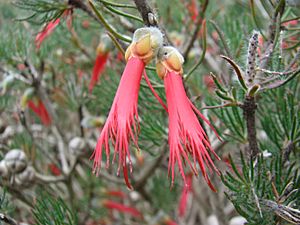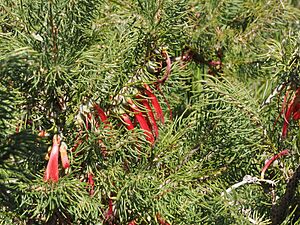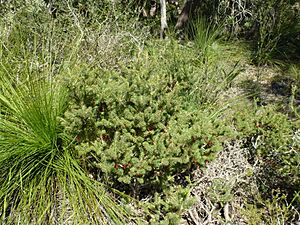Silky-leaved blood flower facts for kids
Quick facts for kids Silky-leaved blood flower |
|
|---|---|
 |
|
| Calothamnus sanguineus in the Royal Botanic Gardens, Cranbourne | |
| Scientific classification |
|
| Kingdom: | Plantae |
| Clade: | Tracheophytes |
| Clade: | Angiosperms |
| Clade: | Eudicots |
| Clade: | Rosids |
| Order: | Myrtales |
| Family: | Myrtaceae |
| Genus: | Calothamnus |
| Species: |
C. sanguineus
|
| Binomial name | |
| Calothamnus sanguineus Labill.
|
|
| Script error: The function "autoWithCaption" does not exist. | |
| Synonyms | |
|
|
Script error: No such module "Check for conflicting parameters".
The silky-leaved blood flower (Calothamnus sanguineus) is a special plant. It belongs to the myrtle family, called Myrtaceae. This plant only grows in the southwest part of Western Australia. The local Noongar people call it Boolgalla.
It's a shrub that can stand tall or spread out. It has short, round leaves. Its flowers are usually red, sometimes white. They have a unique shape. You can often see it flowering in autumn, winter, or spring. This plant was the first of its kind to be officially named.
Contents
What Does the Silky-Leaved Blood Flower Look Like?
Calothamnus sanguineus is a shrub. It can grow up to 2 metres (6.6 ft) tall. Its leaves are about 10–20 millimetres (0.4–0.8 in) long. They are round if you cut them in half. These leaves often have many long, soft hairs.
Flowers and Fruits
The flowers are usually bright red. Sometimes they can be white. Each flower has four sepals and four petals. It also has four groups of stamens. These stamen groups look a bit like claws.
The two top groups of stamens are wider and longer. They are also joined together for most of their length. You can see these flowers from March to November. After the flowers, the plant grows woody fruits. These fruits are called capsules.
How the Silky-Leaved Blood Flower Got Its Name
The plant Calothamnus sanguineus was first officially described in 1806. A French scientist named Jacques Labillardière gave it its name. He found a sample of the plant in 1793. This happened during an exploration trip called the d'Entrecasteaux expedition.
Where Does the Silky-Leaved Blood Flower Grow?
You can find Calothamnus sanguineus in many parts of Western Australia. It grows from Cape Naturaliste all the way up to Kalbarri. It lives in different types of areas. These include sandy plains, rocky limestone hills, and granite outcrops.
Is the Silky-Leaved Blood Flower Safe?
The Western Australian government says that Calothamnus sanguineus is "not threatened." This means there are enough of these plants in the wild. They are not in danger of disappearing.



